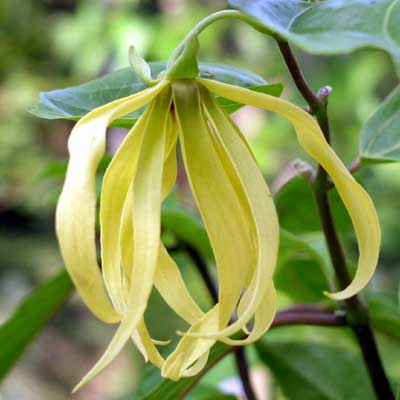
In Indonesia, ylang ylang flowers are placed on the bed of a newlywed couple on their wedding night...
Ylang ylang is intoxicating and uplifting with an intensely sweet, floral scent.
Nature: exotic, enticing
It is sedative and soothing, making it particularly useful for calming rapid breathing and increased heart rate.
It has a balancing effect on skin and can be used for both oily and dry skin conditions.
Ideal in a hair rinse (add 2 drops in your rinse water), and as a general tonic for the scalp.
Principal Actions: Euphoriant, skin and hair rejuvenator, circulatory system stimulant.
Practical Uses
Methods of Use: massage, bath, shower, add to skin care products, body oil, face oil, air spray, burner, deodorize, vaporize
Skin Care with Ylang Ylang
Ylang ylang is used in general skin care for acne, dry skin conditions, hair growth, hair rinse, insect bites, irritated and oily skin.
To clarify and balance oily or combination skin: Mix 2 drops ylang ylang, 4 drops bergamot, 2 drops geranium into 20ml/4tsp of a light carrier oil such as grapeseed. Apply to the face as necessary.
Circulation, Muscles & Joints
Ylang ylang has a regulating effect on the cardiac and respiratory systems and is helpful in cases of high blood pressure, hyperpnoea (abnormally fast breathing), tachycardia (rapid heartbeat) and palpitations.
To help balance high blood pressure and ease hypertension: Mix 2 drops ylang ylang, 4 drops sweet marjoram 4 drops lavender and use in a bath or vaporize.
Add this mixture to 20ml/4tsp carrier oil to use in a massage. Additional oils that are helpful include lemon balm (melissa), lemon, clary sage and yarrow.
To ease palpitations: Mix 2 drops ylang ylang, 4 drops sweet orange, 4 drops rose into 20ml/4tsp carrier oil and use in a massage.
Nervous System
This exotic oil lifts the spirits, promotes relaxation and is well known for its sensual properties. The uplifting scent is superb in relieving emotional states of anxiety, depression, frigidity, impotence, insomnia, nervous tension and stress-related disorders.
The following blends can be mixed together and used in a bath, vaporized or added to 20ml/4tsp carrier oil and use in a massage:
To ease emotional anxiety: Mix 2 drops ylang ylang, 4 drops jasmine and 4 drops lavender
- For emotional anxiety, ylang ylang can also be combined with bergamot, lemon balm (melissa) or frankincense.
To ease nervous tension: Mix 2 drops ylang ylang, 4 drops rose and 4 drops sandalwood
- For nervous tension and stress-related disorders, ylang ylang can also be combined with clary sage, cedarwood, chamomile, frankincense, jasmine, lemon balm (melissa), sweet marjoram, neroli, patchouli, rose or vetiver.
Safety Data: non-toxic, non-irritant, although ylang ylang may irritate sensitive skin - some cases of sensitization have been reported. Avoid using ylang ylang on inflammatory skin conditions and dermatitis. Powerful oil, dilute well and use in small quantities, in moderation; the heady scent of ylang ylang can cause headaches or nausea.
Ylang Ylang in Aromatherapy
Botanical Name: Cananga odorata
Note: Base - 91
Parts Used: large flowers from a tropical tree 20 m high
Source: water or steam distillation of the flowers of the tall tropical tree native to Asia. Most of the oil is produced in Madagascar, Reunion and the Comoros Islands. Some sources are distilled from the flowers of the tree in the Philippines.
Description and Odor Effect: a pale yellow liquid with an intensely sweet, floral scent reminiscent of a blend of jasmine and almonds. Its odor effect is intoxicating and antidepressant.
Blends well with: clary sage, frankincense, geranium, jasmine, neroli, rose, sandalwood, vetiver, citrus essences, other floral essences
Applications: massage, bath, shower, add to skin care products, body oil, face oil, air spray, burner, deodorize, vaporize
Therapeutic Properties: antidepressant, antipruritic, antiseptic, aphrodisiac, calmative, carminative, emmenagogue, emollient, euphoriant, fixative, hair/scalp tonic, hypotensor, moisturizer, muscle relaxant, nervine, rejuvenator (skin and hair), relaxant, sedative (nervous system), stimulant (circulatory system), tonic
Safety Data: non-toxic, non-irritant, some cases of sensitization reported. Use in moderation; the heady scent of ylang ylang can cause headaches or nausea.
Other: There are four grades of this essential oil – ylang ylang extra, ylang ylang #1, ylang ylang #2, and ylang ylang #3. The essential oils are obtained by slow distillation, and the producers draw off different grades of essential oil at different stages. The first distillate (about 40 per cent) is called ylang ylang extra, and is considered to be the best grade. There are three further successive distillates, called grades 1, 2 and 3. Ylang ylang Extra has the most therapeutic value for use in aromatherapy.
Ylang Ylang – Quick Reference
Skin: acne, hair growth, hair rinse, insect bites, irritated and oily skin, general skin care
Circulation, Muscles & Joints: high blood pressure, hyperpnoea (abnormally fast breathing), tachycardia (rapid heartbeat), palpitations
Nervous: depression, frigidity, impotence, insomnia, nervous tension and stress-related disorders
Keyword: Sensual
Ylang Ylang Magic: The calmer and creator of peace and love. Used to dispel anger, negativity, fear or frigidity.
Ylang Ylang Harmony
Add these essential oils to 20 ml / 4 teaspoons carrier oil
To lift mood and ease depression
- 2 drops Ylang Ylang
- 4 drops Benzoin
- 4 drops Tangerine
If you appreciate the information provided,
please help keep this website running. Blessings!
© 2008-2025 aromaworx.ca. All rights reserved.

